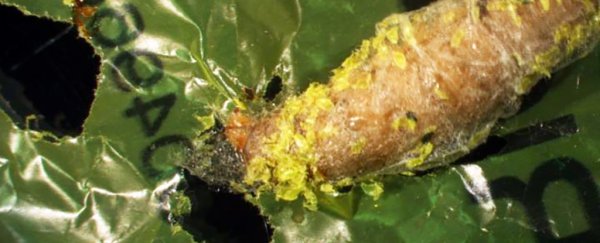Scientists may have found some surprising helpers in our battle against plastic waste: honeycomb moth caterpillars with a taste for munching through plastic bags.
The critters' unusual choice of diet was discovered almost by accident, but now researchers want to use the bugs to develop a quick way of breaking down the polyethylene material that's found in many non-biodegradable plastics.
Put together 100 caterpillars of the Galleria mellonella variety and they'll chomp through 92 milligrams of plastic in half a day, the team from the Institute of Biomedicine and Biotechnology of Cantabria in Spain discovered.
"Our study is the first scientific work to show that this species eats plastic with the chemical depolymerisation of polyethylene," one of the researchers, Federica Bertocchini, told Lef Apostolakis at New Scientist.
The scientists noticed the caterpillars' plastic-munching capabilities after removing them from a beehive (where they have a tendency to eat through beeswax) and placing them in plastic bags. Before long, the bags were full of holes, and the caterpillars had escaped.
These creatures might be digesting polyethylene in the same way as they digest beeswax, the scientists suggest, using special enzymes in their gut and breaking down similar types of chemical bonds along the way.
To find out what was going on, the team ground some of the caterpillars into a paste and spread a thin layer of it onto a polyethylene film. Within 14 hours, the substance had broken down 13 percent of the plastic.
The bugs, commonly known as wax worms, also left traces of ethylene glycol, which indicates polyethylene breakdown.
Similar plastic-eating powers have previously been spotted in Plodia interpunctella wax worms and Ideonella sakaiensis bacteria, so this isn't exclusive to this type of caterpillar.
While it might be tempting to breed thousands of these creatures and put them to work in dumpsters across the globe, scientists are going to have to be a whole lot more strategic than that - they pose a huge threat to bee populations thanks to their love of beeswax.
According to The Guardian, the two common species of wax moth, which includes Galleria mellonella, are thought to cause more than US$5 billion worth of damage to bee colonies every year in the United States alone.
Instead, the key will be to synthesise a substance based on the caterpillars' biology that can naturally dispose of plastic waste.
"We are planning to implement this finding into a viable way to get rid of plastic waste, working towards a solution to save our oceans, rivers, and all the environment from the unavoidable consequences of plastic accumulation," says Bertocchini.
We could certainly use all the help we can get. Estimates suggest up to a trillion plastic bags are used and discarded each year, while experts think around 269,000 metric tonnes of the stuff has found its way into our oceans.
If we don't act fast, there's going to be a greater volume of plastic waste in our oceans than fish by 2050. We're making more plastic than ever before, and not recycling or reusing enough of it.
Maybe tapping into the tastes of the honeycomb moth caterpillars can partly solve the problem, though the researchers are keen to emphasise that we should still continue to cut down on our plastic use.
"We should not feel justified to dump polyethylene deliberately in our environment just because we now know how to biodegrade it," says Bertocchini.
The research has been published in Current Biology.
